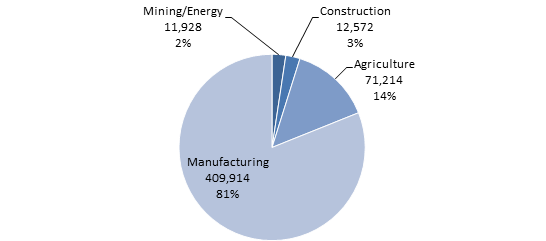In general, emerging countries face a problem of increased waste, due to the accelerated material consumption led by economic growth. Indonesia is no exception. In addition to increased municipal waste, in such countries, a greater amount of industrial waste is produced due to the industrial development, which spurs the waste-related problem.
According to the “State of the Environment Report Indonesia 2012[1]” released by the Ministry of the Environment (currently the Ministry of the Environment and Forestry), the amount of solid waste (“sampah”) generated in Indonesia is 625 million liters per day (equal to 2.5 liters per person per day). The amount of such waste has increased rapidly: it was 200,000 tons per day in 2010 and soon reached 490,000 tons per day in 2012, which was more than doubled. More than half of these solid waste comes from households but a large portion of that is reported not to be treated properly. Solid waste produced within Indonesia consists of kitchen garbage with the largest percentage (65%), followed by paper, plastic, wood and bamboo.
Among them, plastic waste has become a pressing issue in recent years. Accordingly, different measures have started to be taken in Indonesia. For example, in February 2016, a pilot project that charged single-use plastic bags at retail outlets were started in 22 cities across the country. The plastic bag price was set by each local government, with the minimum price of Rp 200. For example, in Jakarta, they were sold at Rp 5000. Furthermore, the state government is now planning to shift to biodegradable plastic shopping bags nationwide by 2021 with the aim to reduce plastic bag waste that is poorly degradable and have a high environmental impact. By the end of 2025, the Indonesian state government aims to reduce its plastic waste by more than 70%.
When looking at hazardous waste (“B3[2] waste”) discharged from business establishments, the natural resource exploiting sector such as mining and energy is the largest producer, which accounts for more than 90%. However, manufacturing sector is highly effective in utilization of B3 waste compared to other sectors. It annually utilizes more than 400,000 tons of B3 waste, accounting for more than 80% of the entire amount of B3 waste produced.


The only company that operates a final disposal facility for hazardous and toxic waste in Indonesia is PT Prasadha Pamunah Limbah Industri (PPLi). Founded in 1994 as a joint venture between the Modern Asia Environment Holding, a US company, and the Ministry of State-Owned Enterprises of Indonesia (with the investment ratio of 95% and 5%), PPLi became a subsidiary of DOWA Group, a Japanese waste disposal giant in 2009. Since PPLi holds all the licenses required for waste treatment by itself, it has a strength and capability to carry out all processes for hazardous and toxic waste independently, from analysis, transportation, intermediate treatment, to the final disposal.
In Indonesia, legal system for waste management can be summarized as below. The Law No. 32/2009 on Environmental Protection and Management regulates hazardous and toxic waste (B3 waste), mainly waste discharged from the industrial sector such as factories. On the other hand, the Law No. 18/2008 on Waste Management covers general waste, with a focus on the management of household waste, having the Government Regulation No. 81/2012 as a subsidiary regulation. Hazardous and toxic waste is under the jurisdiction of the Ministry of Environment and Forestry (under Law No. 32/2009), and general is under the jurisdiction of the Ministry of Public Works and Housing (under Law No. 18/2008).
| Hazardous and toxic (B3) waste | General waste | |
|---|---|---|
| Law | Law No. 32/2009 on Environmental Protection and Management | Law No. 18/2008 on Waste Management |
| Government Regulation | Government Regulation No. 101/2014 on Hazardous and Toxic Waste Management |
|
| Ministerial Regulation |
|
|
[1] The Ministry of Environment and Forestry (2012), “State of the Environment Report Indonesia 2012”
http://apps.unep.org/redirect.php?file=/publications/pmtdocuments/-Indonesia%20SoERIndonesia_SoER_2012.pdf
[2] An abbreviation in Indonesian: Bahan (material), Berbahaya (harmful), Beracun (toxic).
 Indonesia, Waste management
Indonesia, Waste management
























